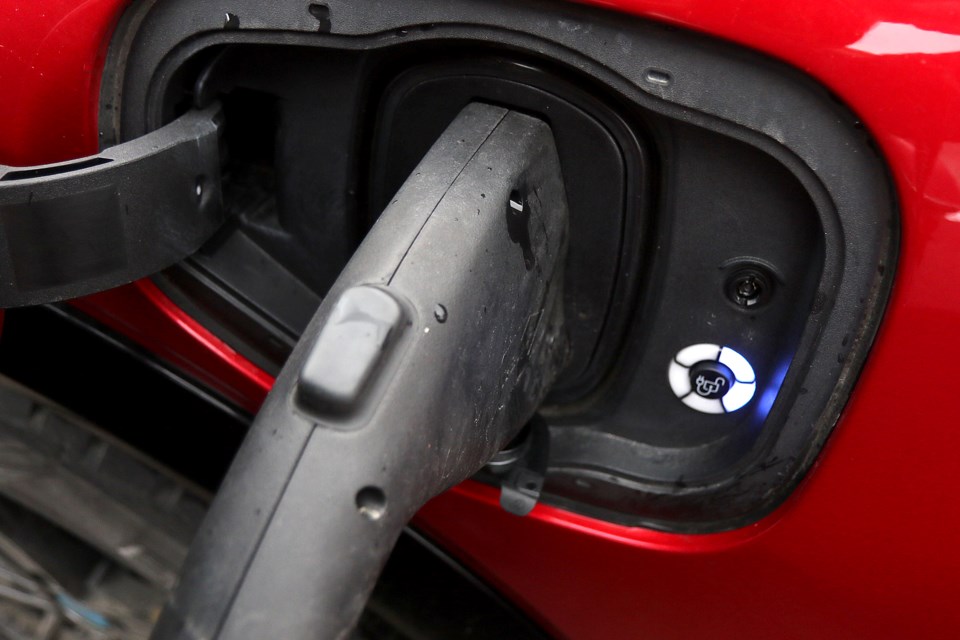THUNDER BAY – In Manitouwadge, Jim Moffat is a rarity.
As the owner of an electric Ford Mustang, he’s one of a handful of electronic vehicle owners in the region, in a community where there are no publicly accessible chargers.
It’s gotten so when other electronic vehicle owners venture into his Northern Ontario town, it’s not uncommon for him to invite them to his home to recharge.
Moffat is hoping items in the latest federal budget may change the need for he and his wife to open their electrical outlets to complete strangers – not that the genial man minds making new friends.
According to MP Patty Hajdu (Liberal, Thunder Bay-Superior North), the federal government will invest $3 billion to make zero-emission vehicles more affordable, through a $5,000 rebate, while changing the entry point to include vehicles priced over $40,000, the limit under the current rules.
The feds will spent $1.7 billion to extend the rebate, with $3.8 billion set aside for a critical mining strategy to develop the means to produce materials needed to build electric vehicles.
The Ontario government previously had a rebate program in place, but it was cancelled in 2018 when the Conservatives under Doug Ford took the provincial reins. Both the Green Party ($10,000) and the Liberals ($8,000) have committed to reinstating rebates if elected in June, according to a recent CBC article.
Ford recently told the Toronto Star the subsidies won’t return under a Conservative government.
Moffat said the federal government’s move is a good start, particularly in this neck of the woods.
“I’m glad to see there’s money going into the EV world, especially in smaller communities like Manitouwadge,” he said. “That’s going to help with tourism. A lot more people are travelling with EV vehicles. It is the wave of the future, so bring on the infrastructure and come on people, let’s go electric.”
Part of the Liberal plan includes expanding the nation-wide network of charging station, which currently is a hit-or-miss situation.
Moffat estimates his Mustang gets about 400 kilometres when fully charged, but said because of a lack of accessible chargers on the road, long road trips aren’t as feasible as they would have been in his previous vehicle, a gasoline-powered Mustang.
“This is something we definitely need in the community,” said Moffat, a members of the Electric Vehicle Association of Northern Ontario, who met with Hajdu earlier this week to learn about the budget plan.
Hajdu said the credit will be in place through at least 2025.
Electric vehicles are the future, she added.
In fact, Britain has legislated the end of new diesel and gasoline-powered vehicle sales by 2030 and last fall introduced legislation that would require builders of new homes and buildings to install charging ports, with up to 145,000 expected to be installed each year.
Hajdu said there’s no reason Canada can’t move in that direction.
“Absolutely,” she said, noting manufacturers have announced plans to set up shop to build the batteries needed to power the coming wave of electric vehicles.
“This is a good news story for the economy of Canada, both on the production side and on the distribution side. But also it’s a critical ingredient in reducing carbon emissions. Budget 2022 doesn’t just talk about private vehicles. It talks about supports for small- and medium-sized businesses to renew their fleet with electric vehicles and reduce emissions from the many ways we transport goods in this country.”
However, the industry isn’t quite as optimistic about being able to meet the federal government’s target of one-in-five vehicles being sold in 2026 being electric, a number that jumps to 60 per cent by 2030.
Brian Kingston, who heads the Canadian Vehicle Manufacturers’ Association, said the Liberal timetable doesn’t match up with current supports for consumers and charging infrastructure – and the budget doesn’t do enough to address the situation.
“Automakers are investing billions of dollars in Canada to assemble electric vehicles, build a battery supply chain and create good jobs,” Kingston said, in a release.
“We had hoped this budget would start to connect the dots between Canada’s ambitious electric vehicle adoption targets and the government supports required to help Canadians make the switch to electric.”
